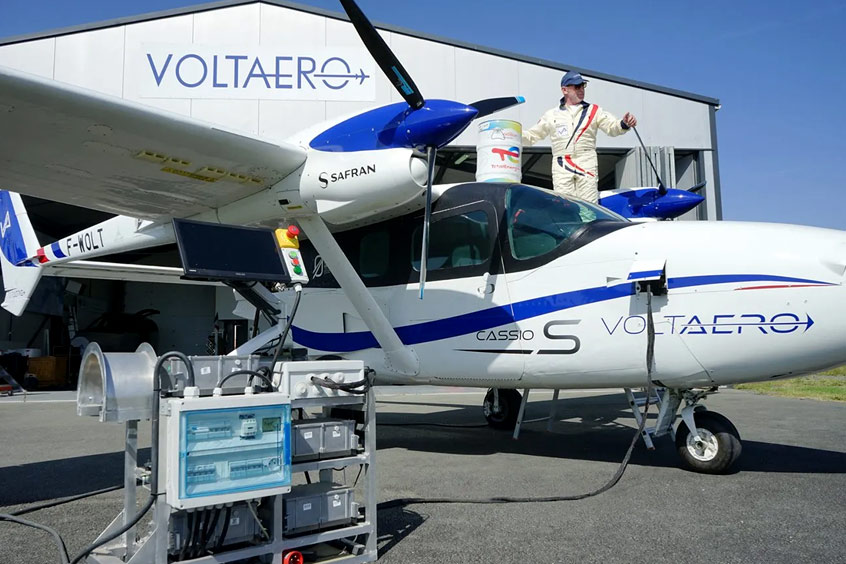
In an aviation industry first, France-based aircraft developer VoltAero has flown the proprietary electric-hybrid powertrain for its Cassio family of aircraft with 100 per cent sustainable fuel.
Conducted from VoltAero's development facility at Royan, France, the milestone flight utilised the hybrid powertrain's electric mode and its internal combustion engine, which was fuelled by TotalEnergies' Excellium Racing 100, made from bioethanol produced from waste that originates in French vineyards.
This milestone demonstration was performed with VoltAero's Cassio S testbed airplane, operated by the company to validate its electric-hybrid powertrain and the application of sustainable fuels, thereby de-risking airworthiness certification for upcoming production versions of the Cassio aircraft family.
“Based on initial results, we calculated a truly impressive CO2 reduction of approximately 80 per cent while operating the Cassio powertrain in its electric-hybrid mode and with the internal combustion engine fuelled by TotalEnergies' Excellium Racing 100,” says CEO and chief technology officer Jean Botti. “It underscores the opportunity for production Cassio aircraft to represent a major step closer to aviation's decarbonisation goals by replacing standard Avgas 100 high-octane fuel for aviation piston engines.”
Botti adds that VoltAero is proud to have been associated with TotalEnergies in this achievement, which marks an advancement toward the future use of biofuel in general aviation, and which complements the ongoing introduction of sustainable aviation fuel (SAF).
Excellium Racing 100 fuel has been used since 2022 in certain automobile competitions, including the famous 24 Hours of Le Mans endurance sports car race. It is made from winemaking waste and allows a reduction in CO2 emissions of at least 65 per cent over its entire life cycle when compared with the fossil fuel equivalent.
“This demonstration flight is part of our commitment to support players in the aviation sector for their decarbonisation objectives,” says TotalEnergies president Joël Navaron. “More broadly, it demonstrates our desire to continue our research and development efforts to offer an alternative to aviation gasoline containing lead, thereby meeting the challenges of general aviation's decarbonisation. We already have initiated several actions, such as the installation of several electric charging stations for general aviation aircraft and the launch of a pilot programme aimed at offering SP98-type fuel for compatible aircraft.”
VoltAero's Cassio family will be a highly capable and reliable aircraft product line for regional commercial operators, air taxi/charter companies and private owners, as well as in utility-category service for cargo, postal delivery and medical evacuation applications.
By integrating VoltAero's patented electric-hybrid propulsion system into the purpose-designed airframe, Cassio will deliver an order of magnitude higher performance, as compared to the current competition, and provide significantly lower operational costs.
The VoltAero propulsion concept is unique: Cassio aircraft will utilise an electric motor in the aft fuselage-mounted hybrid propulsion unit for all-electric power during taxi, take off, primary flight (if the distance traveled is less than 150km) and landing. The hybrid feature, with an internal combustion engine, comes into play as a range extender, recharging the batteries while in flight. Additionally, this hybrid element serves as a backup in the event of a problem with the electric propulsion, ensuring true fail-safe functionality.
VoltAero's first production aircraft will be the Cassio 330, with a four/five seat interior configuration and operating on a combined electric-hybrid propulsion power of 330 kilowatts.